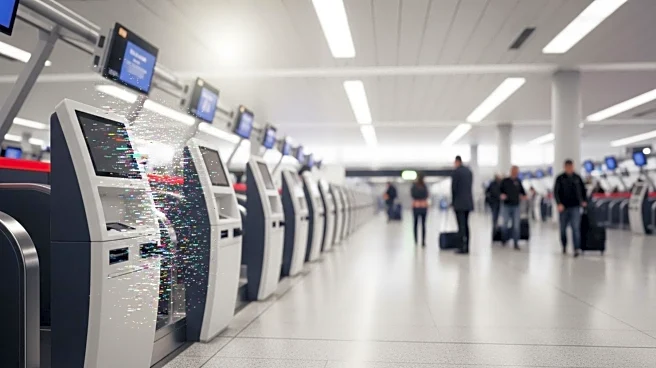What is the story about?
What's Happening?
Major airports across Europe, including London's Heathrow, Berlin Airport, and Brussels Airport, are working to restore normal operations following a cyberattack that disrupted automatic check-in systems. The attack targeted Collins Aerospace, a provider of check-in and boarding systems, leading to long queues, flight cancellations, and delays. Brussels Airport reported that 45 out of 257 scheduled departing flights were canceled, with delays ranging from 30 to 90 minutes. Despite the disruptions, some passengers reported minimal impact, particularly those who had completed online check-in. The incident is part of a broader trend of cyberattacks affecting various sectors, including healthcare and automotive industries.
Why It's Important?
The cyberattack on European airports highlights the vulnerability of critical infrastructure to digital threats, emphasizing the need for robust cybersecurity measures. The disruption affects thousands of travelers, potentially leading to economic losses for airlines and airports due to canceled flights and delayed operations. It underscores the importance of cybersecurity in maintaining operational continuity in the aviation industry, which is crucial for international travel and commerce. The incident may prompt increased investment in cybersecurity solutions and protocols to prevent future occurrences, impacting stakeholders such as airlines, airport operators, and technology providers.
What's Next?
Airports are expected to continue working with Collins Aerospace to resolve the check-in system issues, with manual workarounds in place to minimize disruptions. Regulatory bodies may investigate the source of the cyberattack, potentially leading to enhanced cybersecurity regulations and standards for the aviation industry. Airlines and airports might review and upgrade their cybersecurity infrastructure to prevent similar incidents. The event could also lead to increased collaboration between technology providers and aviation stakeholders to develop more resilient systems.
Beyond the Headlines
The cyberattack raises ethical and legal questions about the responsibility of technology providers in safeguarding critical infrastructure. It may lead to discussions on the balance between technological advancement and security, as well as the potential consequences of cyber vulnerabilities in interconnected systems. The incident could also influence public perception of cybersecurity in travel, affecting consumer trust and behavior.


















